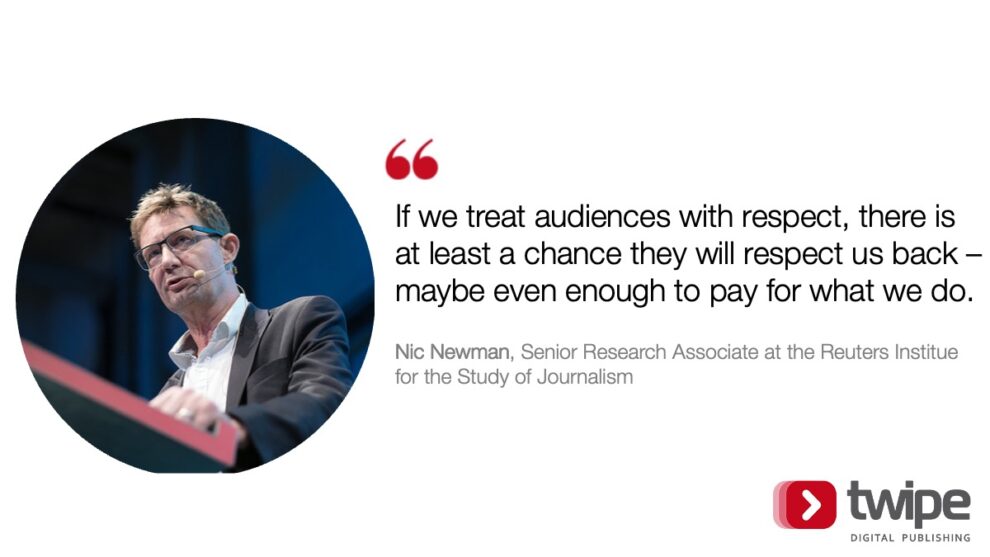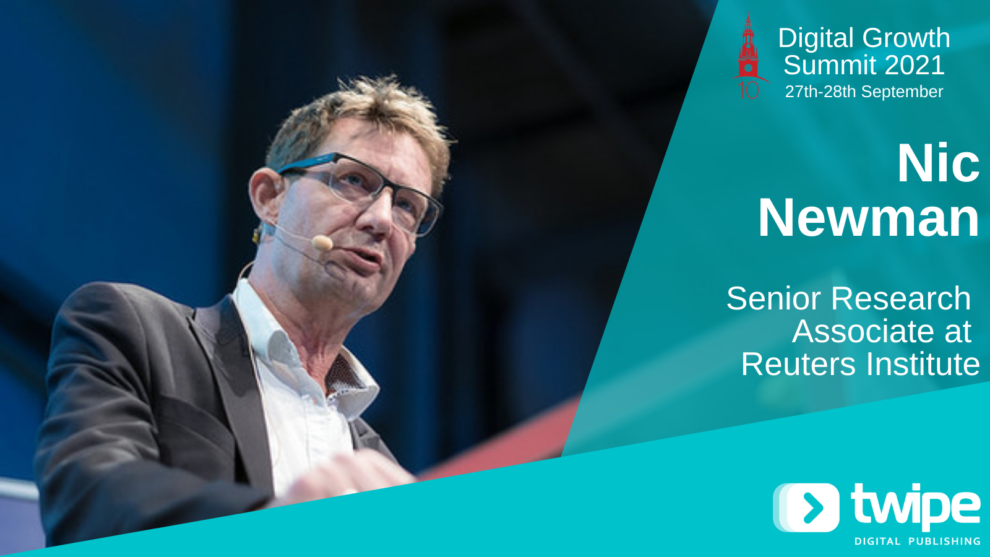Blog
What audiences really want from the news, and what publishers can do about it

Written by Nic Newman, Senior Research Associate at the Reuters Institute for the Study of Journalism
Others in this series have noted the ways in which digital disruption has turned the industry on its head over the last decade. The move from scarcity of information to abundance through low-cost publishing and distribution has brought new competition, undermined business models, and made it hard for many to distinguish fact from fiction.
But much of the news industry has not helped itself by chasing clicks, sensation and short-term profits often abandoning values that have built trust over decades. In the process many media companies have alienated traditional readers and failed to build relationships with the next generation of news consumers.
Across countries less than half of us (44%) say they trust most news most of the time, according to our most recent Digital News Report and this is lower still in countries such as France (30%) and the United States (29%). A significant proportion think that news coverage is unfair to them – especially political partisans, under-35s, people from less advantaged areas and some ethnic minorities. Many feel that journalists are better at breaking the news that explaining it. Young people, in particular, say that the news agenda is often too repetitive, too negative, too much about politics, and lacking in hope. While many remain engaged, we find signs that others are turning away from the news media and in some cases avoiding news altogether.

The pandemic and the winds of good change
But it is not all bad news. The Covid-19 pandemic has led more people to seek out accurate and reliable information with trusted, high-quality brands benefiting most in a number of countries.
Over the last few years, we have also seen how subscription and membership is becoming a sustainable model for a growing number of high-quality and niche publications, and in a few cases for local media groups and individuals. Those trends have been accelerated by the pandemic, but it is also clear that paid content is not a silver bullet. It won’t work for all publishers, nor will it work for all consumers. The vast majority are still not prepared to pay for online news and with more high-quality content disappearing behind paywalls there are pressing concerns about what happens to those who have limited interest or who can’t afford it.
The Covid crisis has highlighted the need to think about journalism’s future rather than its past. It has forced many media companies to finally address digital-first workflows and new business models. Under threat of regulation, platforms are also looking to promote more reliable content from news brands and are looking to support models other than advertising. Consumers too have rapidly adopted new digital behaviours during lockdowns and this is opening up new opportunities and driving societal change. The younger generation are making their voices heard on issues from Black Lives Matter to Climate Change and are starting to shape new media formats in networks like Instagram and TikTok.
Strategies for success will diverge
In the past, most media companies tended to look very similar with common agendas and business models relying largely on advertising. But over the next ten years it will be harder to talk about ‘the audience; or ‘the news media’.
- We’ll have many more subscription publishers looking to addressing distinct audiences. We’ll see more start-ups and individuals trying to build trust with a specific group or demographic. This will lead to a richer and more diverse set of specialist content, but some of it may also fuel more extreme and partial opinion that aligns with the views of particular engaged audiences.
- The key challenge for other commercial publishers that still want to reach big audiences – nationally or locally – is to rapidly diversity revenue streams. Tech platforms will continue to take the majority of digital advertising so developing e-commerce, events, and premium content will be critical.
- The non-profit sector too will be transformed with platforms, foundations, reader donations and government funding increasingly filling gaps where the market has failed to provide. Public broadcasters will remain under pressure as their universal mission becomes undermined by falling audiences, lack of digital investment, and attacks by populist politicians looking to cut funding. The challenge here will be to reach and engage sufficiently large numbers of people digitally and to get credit for that content in third party platforms.

Lessons for the next decade
But whatever the starting point, there are some lessons that all publishers need to focus on over the next decade.
Firstly, news brands need to be clearer about what they stand for, and where they are going to focus their efforts. This could be about particular types of news or about serving particular audiences. For most publishers, the aim should not be to build trust with everyone but with enough people that really value what you do.
Secondly, news publishers need to lean into new digital formats and behaviours rather than trying to cling on to the approaches that have worked in the past. The 800-word article will still have its place, but audio and visual storytelling will become much more important online. This doesn’t mean that every publisher should start a podcast or a TikTok channel, rather that there is something to learn about creative and engaging storytelling.
Finally, all news publishers need to think more about creating great experiences. That means not interrupting and confusing them with ads or pop-up messages as they try to find the content they want. It means spending far more time obsessing about the needs of your audience and how to satisfy them. In this respect there is much to learn from data and product focused companies like Google, Facebook and Netflix. If we treat audiences with respect, there is at least a chance they will respect us back – maybe even enough to pay for what we do.
Nic Newman is lead author of the Reuters Institute Digital News Report and of an annual report on Journalism and Technology Trends and Predictions. He was a founding member of the BBC News website and subsequently spent ten years as Head of Product for BBC News, Sport and Local.
Nic will be speaking about the current state of digital news at the Digital Growth Summit. Tickets are still available, make sure to get yours here.
Other Blog Posts

Stay on top of the game
Subscribe to Twipe’s weekly newsletter to receive industry insights, case studies, and event invitations.
"(Required)" indicates required fields

